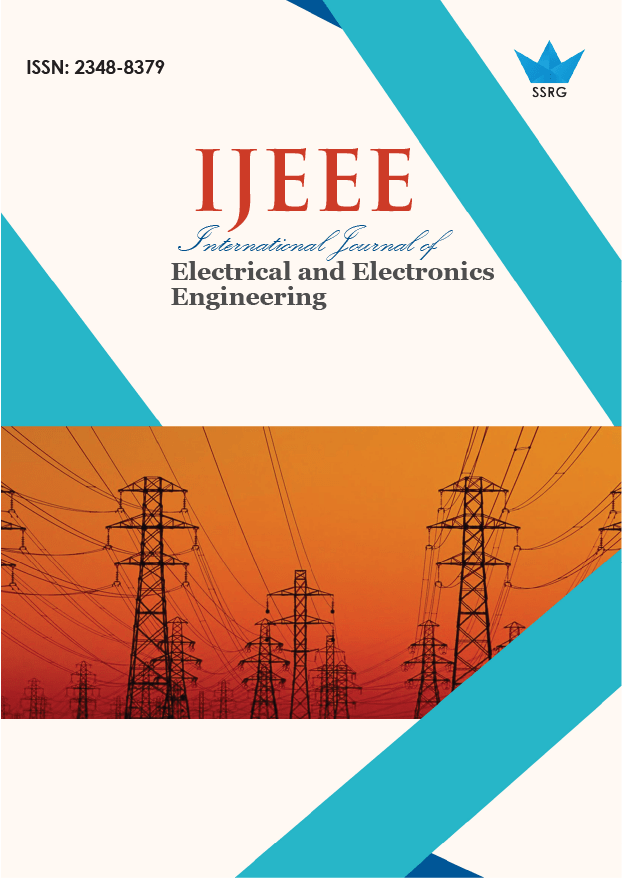Fuel Cost Reduction for Thermal Power Generator with Economic Load Dispatch Problem using SFLA

| International Journal of Electrical and Electronics Engineering |
| © 2018 by SSRG - IJEEE Journal |
| Volume 5 Issue 5 |
| Year of Publication : 2018 |
| Authors : M.Muthuselvi, M.Kavinkumar, G.Mithun Mr.P.Vignesh |
How to Cite?
M.Muthuselvi, M.Kavinkumar, G.Mithun Mr.P.Vignesh, "Fuel Cost Reduction for Thermal Power Generator with Economic Load Dispatch Problem using SFLA," SSRG International Journal of Electrical and Electronics Engineering, vol. 5, no. 5, pp. 20-25, 2018. Crossref, https://doi.org/10.14445/23488379/IJEEE-V5I5P105
Abstract:
Economic load dispatch problem with multiple fuel cost options is one of the major problems in a power system. The thermal plant fuel cost is highly non-linear, because of the load demand and discontinuities for the power generation. This makes the EDP problem a non-linear constrained optimization problem. In the traditional EDP problem, each generator’s cost function is represented by a single quadratic polynomial equation which can be solved by using numerical programming based techniques such as gradient-based method, lambda iteration method. In this paper is to minimize the fuel cost of the power system for the various load conditions by solving the EDP of the real power generation by using SFLA optimization algorithm. This paper compares the optimization techniques such as PSO, MPSO in a 3-unit generating system. The EDP is to determine the optimal combination of power outputs of all generating units to minimize the total fuel cost while satisfying the load demand and operational constraints. The comparisons of results show that the proposed SFLA algorithm provides the less cost of the fuel cost and the quality solution of the power generation. The proposed methodology emerges as robust optimization techniques for solving the ELD problem for different size power system.
Keywords:
Optimal power flow (OPF), Economic load dispatch (ELD), Genetic Algorithm (G.A), particle swarm optimization (PSO), Quantum behaved particle swarm optimization (SFLA).
References:
[1] Lin Lu, Qi Luo, Jun-yong Liu, Chuan Long, “An Improved Particle Swarm Optimization Algorithm”, IEEE International Conference On Granular Computing, pp. 486-490, 2008.
[2] A. Immanuel Selvakumar, Member, IEEE, and K. Thanushkodi, “A New Particle Swarm Optimization Solution to Non convex Economic Dispatch Problems”, IEEE TRANSACTIONS ON POWER SYSTEMS, VOL. 22, NO. 1, pp. 42-51, FEBRUARY 2007.
[3] K. Shabeer khan, S. Selva suriyan, K.VigneshKumar, Dr.P.Mathivanan,"Design and Development of Reusable Sand Power Generation", International Journal of Mechanical Engineering (SSRG-IJME),Volume2 Issue4 2015.
[4] T. O. Ting, Student Member, IEEE, M. V. C. Rao, and C. K. Loo, Member, IEEE,“A Novel Approach for Unit Commitment Problem via an Effective Hybrid Particle Swarm Optimization”, IEEE TRANSACTIONS ON POWER SYSTEMS, VOL. 21, NO. 1,pp. 411-418, FEBRUARY 2006.
[5] Rakesh Dang, S.K. Mangal, Gaurav,"Exergoeconomic Analysis of 600 MW Thermal Power Plant",International Journal of Thermal Engineering (SSRG-IJTE),Volume-2 Issue-1 2016.
[6] Zwe-Lee Gaing, “Particle Swarm Optimization to solving the Economic Dispatch Considering the Generator Constraints”, IEEE Trans. On Power Systems, Vol.18, No.3, pp. 1187-1195, August 2003.
[7] P. Venkatesh, R. Gnanadass, and Narayana Prasad Padhy, “Comparison and application of evolutionary Programming techniques to combined economic Emission dispatch with line flow constraints”, IEEE Trans, on Power Syst., Vol. 18, No. 2, pp. 688-697, May 2003.
[8] Hirotaka Yoshida, Kenichi Kawata, Yoshikazu Fukuyama, Member, IEEE, Shinichi Takayama, and Yosuke Nakanishi,Member, IEEE,“A Particle Swarm Optimization for Reactive Power and Voltage Control Considering Voltage Security Assessment”, IEEE TRANSACTIONS ON POWER SYSTEMS, VOL. 15, NO. 4, pp. 1232-1239, NOVEMBER 2000.
[9] S. Balakumar, C. Sathivel,"Study of Ocean Thermal Energy Conversion Power Plant", International Journal of Thermal Engineering (SSRG-IJTE),Volume 1 Issue 2,2015.
[10] Angeline, P. J. “Using selection to improve particle swarm optimization”, Proceedings of IEEE Congress on Evolutionary Computation 1998Anchorage, Alaska, USA, 1998b.
[11] H. T. Yang, P. C. Yang, and C. L. Huang, “Evolutionary programming based economic dispatch for units with non-smooth fuel cost functions”, IEEE Trans. on Power Systems, Vol. 11, No. 1, pp. 112-118, Feb. 1996.
[12] J. Kennedy and R. C. Eberhart, “Particle swarm optimization,” Proceedings of IEEE International Conference on Neural Networks (ICNN‟95),Vol. IV, pp. 1942-1948, Perth, Australia, 1995.
[13] B H Chowdhury and S Rahman, “A Review of Recent Advances in Economic Dispatch”, IEEETransactions on Power System, Vol 5, no 4, pp.1248-1259, 1990.
[14] D W Ross and S Kim, “Dynamic Economic Dispatch of Generation”, IEEE Transactions on Power Apparatus and Systems, pp. 2060, November/December1980.

 10.14445/23488379/IJEEE-V5I5P105
10.14445/23488379/IJEEE-V5I5P105